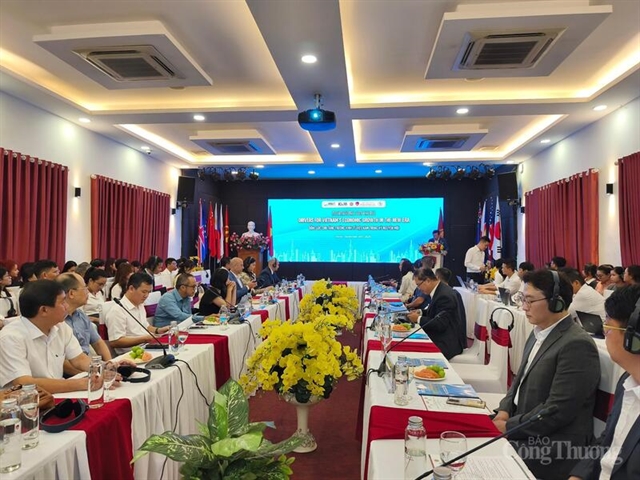 Politics & Law
Politics & Law

 |
| Representatives from government agencies and international organisations at the international conference in Hà Nội on Tuesday. — Photo congthuong.vn |
HÀ NỘI — Việt Nam must renew its growth drivers in alignment with its development aspirations and challenges of the new era, experts were told at an international conference in Hà Nội on Tuesday.
Jointly held by the University of Economics and Business (under Việt Nam National University – Hà Nội), the Institute of World Economics and Politics (IWEP) and the Việt Nam Academy of Social Sciences (VASS), the conference is one of the key events within the seventh International Conference on Việt Nam Studies (ICVNS 2025) running from June to September this year.
In his opening remarks, Deputy Head of the Central Strategy and Policy Commission Nguyễn Đức Hiển emphasised that Việt Nam is entering a historically significant phase of development, with an ambitious target of double-digit economic growth for 2026-2030.
This goal is considered not only a strategic aspiration but also a measure of the country’s vision, resilience and capacity for macroeconomic management.
However, this means Việt Nam cannot continue relying on traditional growth drivers such as resource mining, low-cost labour, or expanded capital investment, said Hiển.
“Việt Nam must create modern and sustainable growth drivers that align with the digital and green era, while effectively leveraging opportunities from global economic integration to achieve a breakthrough,” he said.
Sharing the same perspective, Dr Phạm Anh Tuấn, IWEP deputy director-general, noted that the increasingly complex global developments require Việt Nam to innovate its development mindset.
The country should adopt flexible and groundbreaking strategies, seize opportunities, overcome challenges, and gradually assert its position on the world stage, he said.
Meanwhile, UEB rector Dr Lê Trung Thành stressed the urgent need to establish modern and sustainable growth drivers for Việt Nam. These should be based on transparent frameworks, innovation, digital transformation, and green development.
During the conference, representatives from government agencies and international organisations also discussed strategic solutions to help Việt Nam achieve double-digit economic growth during the 2026-2030 period, and meet its goal of becoming a developed nation by 2045.
On this topic, Dr Lê Xuân Sang from the IWEP proposed an economic growth model focused on enhancing national resilience and recovery, particularly in the context of stagnant globalisation and rapid advancements in green, digital transitions.
Representatives from international organisations, including the World Bank and the International Monetary Fund, emphasised that in the face of multiple global economic changes, Việt Nam needs to identify key drivers for growth in the new era.
These drivers, they noted, include modernising institutions to create a transparent and fair environment that unlocks private resources.
Additionally, it is crucial to prioritise the development of science and technology, foster innovation, and accelerate digital transformation to enhance productivity and national competitiveness.
Việt Nam must also focus on cultivating high-quality human resources, especially in advanced technology, digital economy, green economy, and international governance.
Alongside these efforts, experts underscored the need to strengthen the role of the domestic private sector, improve the efficiency of foreign direct investment (FDI) attraction in alignment with technology transfer, and establish sustainable ecosystems for production and innovation.
Most importantly, economic growth must be linked to green development, environmental protection, social equity, and an improvement in the quality of life for citizens.
Recently, Việt Nam has been pursuing strategic breakthroughs. Four strategic resolutions for reforms, known as the ‘four pillars,’ have been outlined in the Party resolutions.
They aim to reform legislative processes and law enforcement; foster science, technology, innovation and digital transformation; promote extensive and comprehensive international integration; and boost the private economic sector.
Resolution No. 71-NQ/TW on breakthroughs in education and training was also issued by the Politburo in August, positioning the sector as a core factor in improving human resources quality to meet Việt Nam’s growth demands in the new era.
These foundations are critical to Việt Nam’s focus on institutional modernisation, scientific and technological advancement, human capital development, the development of the private sector, and the alignment of economic growth with social equity and green development goals.
According to UEB vice rector Dr Nguyễn Anh Thu, this international conference not only provides a scientific basis for policymaking, but also fosters dialogue between researchers, policymakers and the business community. This aims to materialise the national aspiration of transforming Việt Nam into a prosperous, developed and sustainable nation. — VNS




